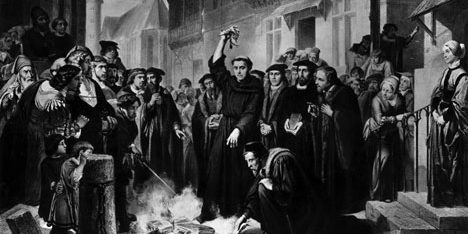
Reformation Book Recommendations-part 2 (Matthew Barrett)
Yesterday I began this series by recommending a handful of books on the Reformation for the beginner. Today I want to recommend a bunch for those looking to go deeper. Honestly, there are legions of books I could recommend. I have shelves full of them! But here are some I think are especially helpful.
 Alister McGrath. Reformation Thought: An Introduction. Fourth Edition. Oxford: Wiley-Blackwell, 2012.
Alister McGrath. Reformation Thought: An Introduction. Fourth Edition. Oxford: Wiley-Blackwell, 2012.
If you are on your way to seminary, be sure to take a class on the Reformation, even if it is not required. If you do, it is very likely you will be required to read McGrath’s textbook on the Reformation. McGrath does a good job of explaining some of the social and theological factors behind the Reformation.
I also like how he introduces medieval theology at points to explain why the Reformers reacted the way they did at the time they did. Also, he has several helpful appendixes at the end that guide the reader on where to find works by the Reformers. This textbook will be around in the years to come, no doubt.
 Euan Cameron. The European Reformation. Second Edition. Oxford: Oxford University Press, 2012.
Euan Cameron. The European Reformation. Second Edition. Oxford: Oxford University Press, 2012.
Carter Lindberg. The European Reformations. Second Edition. Oxford: Wiley-Blackwell, 2009.
Steven Ozment. The Age of Reform, 1250-1550: An Intellectual and Religious History of Late Medieval and Reformation Europe.New Haven and London: Yale University Press, 1980.
Since I mentioned McGrath’s textbook, I feel compelled to mention three others by Cameron, Lindberg, and Ozment. While each book approaches the Reformation in its own unique way, these three will give you a well-rounded outlook that you won’t receive from reading just one of them. Furthermore, you will notice that each author tends to put forward his own definition of what the Reformation was. So keep your eye out for differing viewpoints among authors on exactly how to define this sixteenth-century reform.
 Diarmaid MacCullough. The Reformation. New York: Penguin. 2003.
Diarmaid MacCullough. The Reformation. New York: Penguin. 2003.
MacCullough’s history of the Reformation is a must read. It is long, very long (but so are some of the others I’ve mentioned), but extremely informative. I wish at times he would have devoted more space and attention to certain figures and events (and less to others), but even in a book of 832 pages it is impossible to cover everything thoroughly. You should walk away from this read feeling the massive impact of the Reformation across Europe.
 Heiko A. Oberman. The Dawn of the Reformation: Essays in Late Medieval and Early Reformation Thought. Grand Rapids: Eerdmans, 1992.
Heiko A. Oberman. The Dawn of the Reformation: Essays in Late Medieval and Early Reformation Thought. Grand Rapids: Eerdmans, 1992.
You really have not read about the Reformation until you allow Heiko Oberman to be your guide. Oberman brings to light the medieval background to the Reformation like no other. And if you read any substantial Reformation historian today, he or she will most likely be relying upon Oberman’s research (just check the footnotes!), even if he or she disagrees with Oberman at points. I would also highly recommend picking up copies of:
Forerunners of the Reformation: Shape of Late Medieval Thought, Illustrated by Key Documents (Fortress)
Harvest of Medieval Theology, The: Gabriel Biel and Late Medieval Nominalism (Eerdmans)
Luther: Man Between God and the Devil (Yale University Press).
 Timothy George. Reading Scripture with the Reformers. Downers Grove, IL: IVP Academic, 2011.
Timothy George. Reading Scripture with the Reformers. Downers Grove, IL: IVP Academic, 2011.
One Oberman student who has published a recent book on the Reformers’ understanding and use of Scripture is Timothy George. His book, Reading Scripture with the Reformers, is one of my favorites. I could not put this book down. George is a fantastic writer and in this book he demonstrates what was so revolutionary in how the Reformers read, preached, and taught the Scriptures. To find out more, check out the interview I did with George for Credo Magazine (p. 66).
 Jaroslav Pelikan. The Christian Tradition: A History of the Development of Doctrine, Vol. 4: Reformation of Church and Dogma (1300-1700) Chicago: University of Chicago Press, 1984.
Jaroslav Pelikan. The Christian Tradition: A History of the Development of Doctrine, Vol. 4: Reformation of Church and Dogma (1300-1700) Chicago: University of Chicago Press, 1984.
McGrath’s textbook above will take you into the theology of the Reformers. However, if you want to go deeper still then take a stab at Jaroslav Pelikan’s older work, Reformation of Church and Dogma (1300-1700), vol. 4 of his The Christian Tradition: A History of Development of Doctrine. Pelikan arranges his treatment thematically, writing on topics such as:
Doctrinal Pluralism in the Later Middle Ages
One, Holy Catholic, and Apostolic [Church]?
The Gospel as the Treasure of the Church
The Word and the Will of God
The Definition of Roman Catholic Particularity
Challenges to Apostolic Continuity
Confessional Dogmatics in a Divided Christendom
If you love Reformation theology and want to sink your teeth deep, then this is your book.
Well, many others deserve mention, but I must stop here. Come back tomorrow and I will recommend writings by the Reformers themselves (after all…that is the list we really want to get to!).
Matthew Barrett (PhD, The Southern Baptist Theological Seminary) is Assistant Professor of Christian Studies at California Baptist University, as well as the founder and executive editor of Credo Magazine. He is the author of Salvation by Grace: The Case for Effectual Calling and Regeneration, and several other forthcoming books, which you can read about at matthewmbarrett.com.
